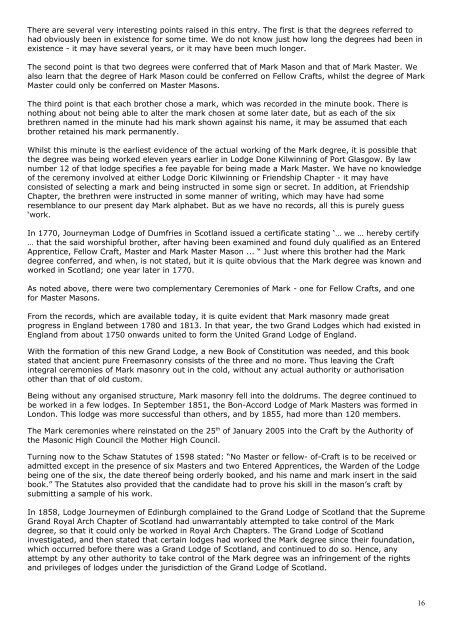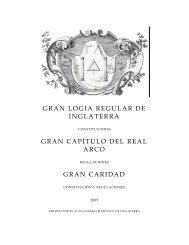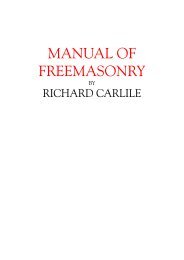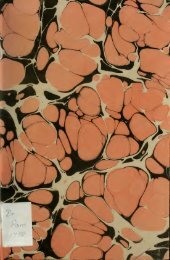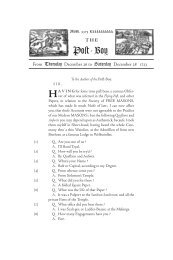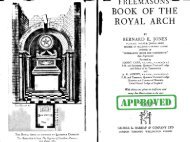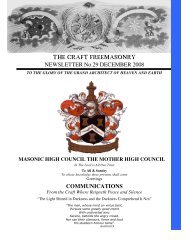THE CRAFT FREEMASONRY - Masonic High Council the Mother ...
THE CRAFT FREEMASONRY - Masonic High Council the Mother ...
THE CRAFT FREEMASONRY - Masonic High Council the Mother ...
You also want an ePaper? Increase the reach of your titles
YUMPU automatically turns print PDFs into web optimized ePapers that Google loves.
There are several very interesting points raised in this entry. The first is that <strong>the</strong> degrees referred to<br />
had obviously been in existence for some time. We do not know just how long <strong>the</strong> degrees had been in<br />
existence - it may have several years, or it may have been much longer.<br />
The second point is that two degrees were conferred that of Mark Mason and that of Mark Master. We<br />
also learn that <strong>the</strong> degree of Hark Mason could be conferred on Fellow Crafts, whilst <strong>the</strong> degree of Mark<br />
Master could only be conferred on Master Masons.<br />
The third point is that each bro<strong>the</strong>r chose a mark, which was recorded in <strong>the</strong> minute book. There is<br />
nothing about not being able to alter <strong>the</strong> mark chosen at some later date, but as each of <strong>the</strong> six<br />
brethren named in <strong>the</strong> minute had his mark shown against his name, it may be assumed that each<br />
bro<strong>the</strong>r retained his mark permanently.<br />
Whilst this minute is <strong>the</strong> earliest evidence of <strong>the</strong> actual working of <strong>the</strong> Mark degree, it is possible that<br />
<strong>the</strong> degree was being worked eleven years earlier in Lodge Done Kilwinning of Port Glasgow. By law<br />
number 12 of that lodge specifies a fee payable for being made a Mark Master. We have no knowledge<br />
of <strong>the</strong> ceremony involved at ei<strong>the</strong>r Lodge Doric Kilwinning or Friendship Chapter - it may have<br />
consisted of selecting a mark and being instructed in some sign or secret. In addition, at Friendship<br />
Chapter, <strong>the</strong> brethren were instructed in some manner of writing, which may have had some<br />
resemblance to our present day Mark alphabet. But as we have no records, all this is purely guess<br />
‘work.<br />
In 1770, Journeyman Lodge of Dumfries in Scotland issued a certificate stating ‘… we … hereby certify<br />
… that <strong>the</strong> said worshipful bro<strong>the</strong>r, after having been examined and found duly qualified as an Entered<br />
Apprentice, Fellow Craft, Master and Mark Master Mason ... “ Just where this bro<strong>the</strong>r had <strong>the</strong> Mark<br />
degree conferred, and when, is not stated, but it is quite obvious that <strong>the</strong> Mark degree was known and<br />
worked in Scotland; one year later in 1770.<br />
As noted above, <strong>the</strong>re were two complementary Ceremonies of Mark - one for Fellow Crafts, and one<br />
for Master Masons.<br />
From <strong>the</strong> records, which are available today, it is quite evident that Mark masonry made great<br />
progress in England between 1780 and 1813. In that year, <strong>the</strong> two Grand Lodges which had existed in<br />
England from about 1750 onwards united to form <strong>the</strong> United Grand Lodge of England.<br />
With <strong>the</strong> formation of this new Grand Lodge, a new Book of Constitution was needed, and this book<br />
stated that ancient pure Freemasonry consists of <strong>the</strong> three and no more. Thus leaving <strong>the</strong> Craft<br />
integral ceremonies of Mark masonry out in <strong>the</strong> cold, without any actual authority or authorisation<br />
o<strong>the</strong>r than that of old custom.<br />
Being without any organised structure, Mark masonry fell into <strong>the</strong> doldrums. The degree continued to<br />
be worked in a few lodges. In September 1851, <strong>the</strong> Bon-Accord Lodge of Mark Masters was formed in<br />
London. This lodge was more successful than o<strong>the</strong>rs, and by 1855, had more than 120 members.<br />
The Mark ceremonies where reinstated on <strong>the</strong> 25 th of January 2005 into <strong>the</strong> Craft by <strong>the</strong> Authority of<br />
<strong>the</strong> <strong>Masonic</strong> <strong>High</strong> <strong>Council</strong> <strong>the</strong> Mo<strong>the</strong>r <strong>High</strong> <strong>Council</strong>.<br />
Turning now to <strong>the</strong> Schaw Statutes of 1598 stated: “No Master or fellow- of-Craft is to be received or<br />
admitted except in <strong>the</strong> presence of six Masters and two Entered Apprentices, <strong>the</strong> Warden of <strong>the</strong> Lodge<br />
being one of <strong>the</strong> six, <strong>the</strong> date <strong>the</strong>reof being orderly booked, and his name and mark insert in <strong>the</strong> said<br />
book.” The Statutes also provided that <strong>the</strong> candidate had to prove his skill in <strong>the</strong> mason’s craft by<br />
submitting a sample of his work.<br />
In 1858, Lodge Journeymen of Edinburgh complained to <strong>the</strong> Grand Lodge of Scotland that <strong>the</strong> Supreme<br />
Grand Royal Arch Chapter of Scotland had unwarrantably attempted to take control of <strong>the</strong> Mark<br />
degree, so that it could only be worked in Royal Arch Chapters. The Grand Lodge of Scotland<br />
investigated, and <strong>the</strong>n stated that certain lodges had worked <strong>the</strong> Mark degree since <strong>the</strong>ir foundation,<br />
which occurred before <strong>the</strong>re was a Grand Lodge of Scotland, and continued to do so. Hence, any<br />
attempt by any o<strong>the</strong>r authority to take control of <strong>the</strong> Mark degree was an infringement of <strong>the</strong> rights<br />
and privileges of lodges under <strong>the</strong> jurisdiction of <strong>the</strong> Grand Lodge of Scotland.<br />
16


